On production and working with MJ
"When I first met Michael he was working on Captain EO (1985) and I was just a studio runner (the guy who goes to get the burgers). But I got a chance to sit in on his sessions after my regular shift was done.
Michael was a consummate professional. If his vocals were scheduled for noon, he was there at 10 am with his vocal coach Seth, singing scales. Yes, scales! I would set up the microphone, check the equipment, make coffee, and all the while he would sing scales for two hours.
Each of his projects was different, but usually there were eight or fewer of us working day to day. No entourage. No Elephant Man bones. No groupies. No drugs. Just music. And food.
When a small group of people are dedicated to creating great music, it is a great place to be… and it was."
Brad Sundberg, studio engineer
The MJCast - Episode 015: Brad Sundberg Special:
Brad Sundberg´s seminars "In Studio With MJ" may be expensive, but they are worth it. You´ll hear many unreleased songs and personal stories, you´ll see private videos, you´ll literally experience birth of a song right from Michael´s mouth while flying through the stars and understand how the albums were created.
“Recording was never a static event. We used to record with the lights out, Michael on my drum platform. Michael would dance on that as we did the vocals. What an incredible experience. The talent was just indescribably huge. Michael combined elements of pop, jazz and soul into a new kind of music and galvanized the world. The way I want to remember him is as the ultimate musician. He was just fantastic and he brought a tremendous amount of musical integrity with him every time he came into the studio.”
"Damn near any chimpanzee could record Michael. I mean he is such a pro, it is unbelievable! ... Michael was not an ordinary vocalist or an ordinary singer. If any young people in the music industry take the decision to use Michael as an inspiration, that's about the smartest thing that they could possibly do. In the studio you hardly knew he was there ‑— he was extremely quiet and polite and kind ‑— but he really cared about the quality of what we were doing. Not only the technical quality, but the musicality, and his pitch, and the lyrics, the arrangements, and so on. For example, I don't think I ever saw Michael with the lyrics in front of him. He'd always been up the night before memorising the lyrics and he sang the songs from memory. And every day that we recorded vocals his vocal coach was there, and he warmed up for an hour beforehand. That made a big difference.”
“Michael Jackson's dedication to his art was unique. During the recordings of the albums, which sometimes lasted for months, he rarely rested. He worked on the lyrics all the time.
Michael was so professional, he was so amazing to work with. When he arrives at the studio to record the vocal part, he usually has the lyrics and melody memorized. Michael was polite and adorable. So he would say, 'Can I hear a little more of the piano in the headphones, please?' And then he gave thanks. The music industry is a place where you don't hear those words much. That is the reason why I totally respect Michael, and for all his musical quality.".
Bruce Swedien, studio ingeneer for Michael Jackson albums for over 25 years (and below is Michael´s note for him)

"What I do when I write is that I'll do a raggedy, rough version just to hear the chorus, just to see how much I like the chorus. If it works for me that way when it's raggedy, then I'll know it will just work... Listen to that, that's at home. Janet, Randy, Me... Janet and I are going "Whoo, Whoo... Whoo, Whoo..." I do that same process with every song. It's the melody, it's the melody that's most important, If the melody can sell me, then I'll go to the next step. The idea is to transcribe from what's in your mentality onto tape. If you take a song like "Billie Jean," Where the bass line is the prominent, dominant piece, the protagonist of the song, the main driving riff that you hear, getting the character of the riff to be just the way you want it to be, that takes a lot of time. Listen, you're hearing four basses on there, doing four different personalities, and that's what gives it character, but it takes a lot of work."
Michael Jackson

"At one point when we were working on Thriller, we were up for days - all of us were just completely exhausted, man. I was bound to snap at one point. I don’t remember the exact reason, it might have been cause a harmony wasn’t right or the lyrics were wrong, but Michael did something I didn’t want, and I got pissed. And I mean pissed, man. And in that moment I just got up and stormed over to Michael and just screamed at him - I don’t even remember what I said but I was just yelling at his face for not doing something right. After a second I snapped out of it and I looked over at Bruce, and noticed he was looking right at Michael. I looked back at Michael… and it was weird, man, cause he was staring right at me, but he wasn’t looking at me. Like he was seeing something else - his eyes were all fogged up. I stared at him for like 10 seconds, and I reached out and touched his shoulder to make sure he was okay, and he sort of snapped out of it and put his arms up, like I was gonna hit him. And it was in that exact moment that I realized exactly what I did, and why he reacted like that, and I felt sick… We took a little break after, since Michael was a little off for the next few hours. Everything was okay, Michael got over it though by morning… He’s so forgiving, you know? All I could think after that was “Man, I hope this kid doesn’t see me like he sees his father”.
Quincy Jones
"I was just finishing the second (guitar) solo when Michael walked in. And you know artists are kind of crazy people. We´re all a bit strange. I didn´t know how he would react to what I was doing. So I warned him before he listened. I said, ´Look, I changed the middle section of your song.´ Now in my mind, he´s either going to have his bodyguards kick me out for butchering his song, or he´s going to like it. And so he gave it a listen, and he turned to me and went, ´Wow, thank you so much for having the passion to not just come in and blze a solo, but to actually care about the song, and make it better.´
He was this musical genius with this childlike innocence. He was such a professional, and such a sweetheart."
Eddie Van Halen

Three-page handwritten letter from Michael Jackson to William Pecchi Jr., written on Capitol Tokyu Hotel stationary c. 1988



Pecky,
I very, very seldom write letters, but in this moving occasion I couldn’t help myself.
I want to thank you for putting the effort forward to capture the magic and excitement of the people of the world. What you do is a very personal and powerful medium to me. It is the art of stopping time, to perserve a moment that the naked eye cannot hold, to capture truth spontaneous truth, the depths of excitement in human spirt. All else will be forgotten, but not the films. Generations from now will experience the excitement you’ve captured; it truly is a time capsule.
I will not be totally satisfied until I know you’re at the right angle at the right time, to capture a crescendo of emotion that happens so quickly, so spontaeously. What you have done was good, but I want the best, the whole picture, cause and effect. I want crowd reaction wide lens shots – depths of emotions, timing. I know we can do it. It is my dream and goal to capture TRUTH. We should dedicate ourselves to this. The person who makes a success of living is the one who sees his goal steadily and aims for it unswervingly. That is dedication. There is no other way to perfection than dedication, perseverance. Just tell us what you need to make it happen. Take the leadership to direct the other cameramen.
I enjoy working with you that is why I asked you to come, you have a gentle spirit that’s very likable. Maybe I look at the world through rose colored glasses, but I love people all over the world. That is why stories of racism really disturb me. You hurt my heart and soul when you told me of your boyhood in Texas. Because in truth I believe all men are created equal. I was taught that and will always believe it. I just can’t conceive of how a person could hate another because of skin color. I love every race on the planet earth. Prejudice is the child of ignorance.
Naked we came into the world and naked we shall go out. And a very good thing too, for it reminds me that I am naked under my shirt, whatever its color. I’m sorry to bring up such past news, but in the car I was hurt by what you said. I’m so happy that you have managed to overcome your childhood past. Thank God that you’ve graduated from such beliefs of ignorance. I’m glad I’ve never experienced such things. Teach your kids to love all people equally. I know you will.
I speak from my heart saying I love you and all people, especially the children. I’m glad God chose me and you.
Love M.J.
Pecchi was a camera operator on Jackson’s film Moonwalker (Ultimate Productions, 1988). After Moonwalker, Pecchi was asked to travel abroad with Jackson during the Bad tour. Pecchi rode to and from venues to capture the crowd’s reaction to Jackson.
"One morning MJ came in with a new song he had written overnight. We called in a guitar player, and Michael sang every note of every chord to him. “here’s the first chord first note, second note, third note. Here’s the second chord first note, second note, third note”, etc., etc. We then witnessed him giving the most heartfelt and profound vocal performance, live in the control room through an SM57.
He would sing us an entire string arrangement, every part. Steve Porcaro once told me he witnessed MJ doing that with the string section in the room. Had it all in his head, harmony and everything. Not just little eight bar loop ideas. he would actually sing the entire arrangement into a micro-cassette recorder complete with stops and fills."
Rob Hoffman, sounds engeneer
Read more: https://www.truemichaeljackson.com/true-stories/in-studio/
Teddy Riley recalls recording of Remember the Time: “So we went back and started the song from the beginning and I watched Michael sing each note and harmony, double it, triple it and then maybe quadruple…each time singing it perfectly, vibratos perfectly matched, perfectly in tune, rhythmically dead on, knowing exactly what he wanted to do the whole time. We were done with all the hooks faster than if I’d flown them in. Flawless. That was day one.”
"I normally record a singer about a dozen times before getting enough to mix together a perfect vocal track for an album. With Michael, it only took two to four takes. And one of those takes would be perfect on its own. But hours of preparation preceded recording. We would change lyrics, tempo and pitch, working for days and hours on getting the song just right before finalizing the track. Thriller was recorded and completed in six months."
Bruce Swedien, engineer and music producer, author of 2009 book, "In The Studio With Michael Jackson"
Read more: https://www.truemichaeljackson.com/true-stories/bruce-swedien-about-mj/


“‘Heartbreak Hotel’ was the most ambitious song I had composed. I think I worked on a number of levels: You could dance to it, sing along with it, get scared by it, and just listen. I had to tack on a slow piano and cello coda that ended on a positive note to reassure the listener; there's no point in trying to scare someone if there isn't something to bring the person back safe and sound from where you've taken them."
Michael Jackson in his autobiography Moonwalk (1988)
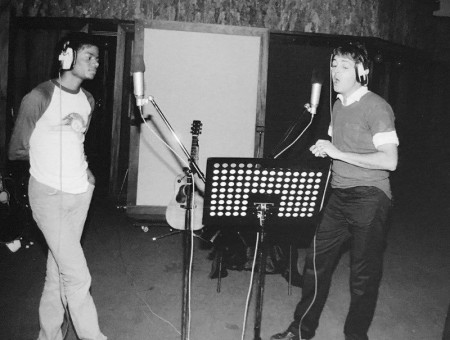
“Before the advent of digital technology, you needed to be creative acoustically and electronically. In the song “Billie Jean,” when Michael sings the line “Do think twice” at end of the third verse, he’s singing through a cardboard mailing tube. We often would record elements in the bathroom (tiled) because it would give it a short early reflection quality. The main percussion sound on the song “Beat It” was Michael beating on fiberboard drum cases with 1x3 inch pieces of wood in the 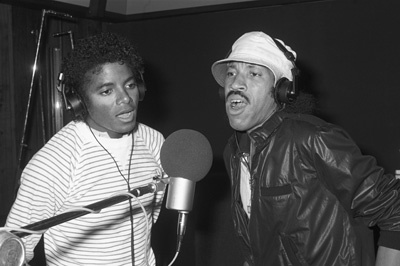 mirrored room of Westlake Studio A.”
mirrored room of Westlake Studio A.”

Matt Forger, a sound engineer
"In the studio, Michael was a hard worker, a really hard worker. He would stand there until he got it right. He likes to perform with the lights out and just a single light on the stand. And he likes to do some of his dances during songs. On "The Lady In My Life", I needed Michael to express an emotion that goes way, way back. I said ‘Smelly, I need you to beg on this. I want a serious beg on this one, which is convincing the lady that this is the way that she should go. Michael knew exactly what I was talking about. He got all embarrassed and started to blush. But he did it and then he ran out of there."
Quincy Jones, legendary producer/composer
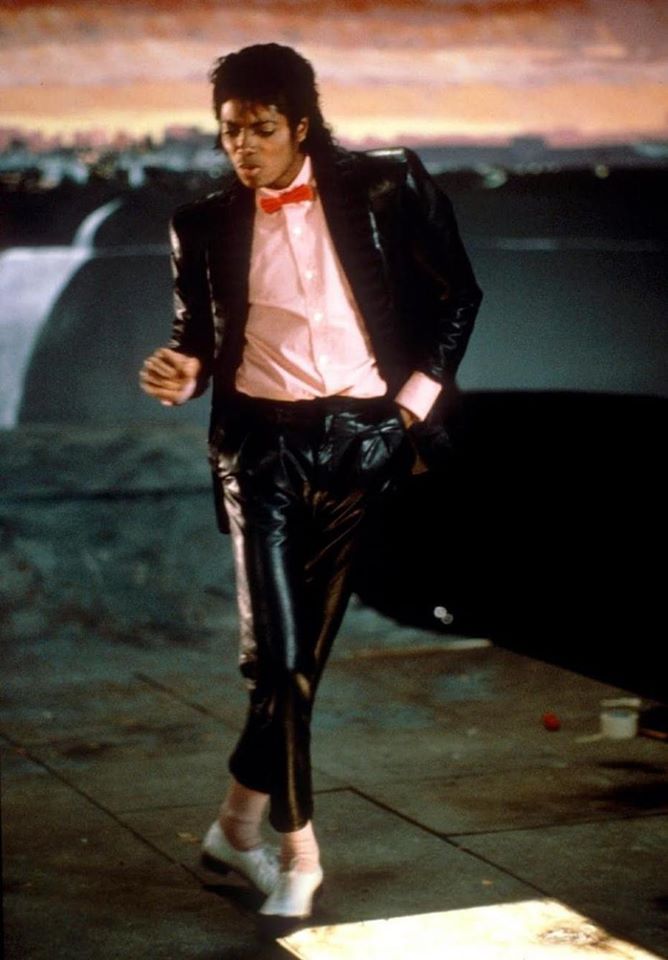
“His manager said to me, ‘make sure you find room for him to dance’. So I went through it with him, and said we had this chorus that we could do the dancing.
When we came to do it, I said ‘I’ll show you all the paving stones that light up’, and I led him along the street. ‘This one, these two, that one…shall we walk it through and rehearse?’, and he said ‘no, let’s just do it.’
I’m on camera tracking back as he came forward - and it was astounding. When he came forward through that chorus, my eyepiece literally steamed up, and I’m thinking, ‘fucking hell, this is amazing, he is incredible.’ Dancing on his toes, the whole thing.
We shot that first take, got to the end, and everyone – up in the gantries, eating their sandwiches, reading the paper, painters working on another set – just burst into applause.
We all just knew we’d seen another era of superstar that the world was about to see. It was a major moment.”
Steve Barron on the making of his video for Billie Jean

"That video was also beyond fun. I confess that Michael brought his own costume, he was into buckles. We wanted to give the dancers the b-boy, bicycle messenger look, which was very tough at the time. Acid wash jeans debuted in that video- they hadn’t been brought to the market yet. I loved dressing the 9 minute black and white film at the beginning of the video, which features a young Wesley Snipes. I don’t think everyone has seen that movie- it explains the concept of the dance, and is hyper realistic."
Rita Ryack, costume designer for "BAD" (photo above)
 “Mick (Jagger) didn't hesitate when Michael told him to warm up his vocal cords before recording their duet "State of Shock" in 1983. It was a classic recording session a year after "Thriller" had cemented Michael’s reputation as the King of Pop.] By then, everyone knew how good Michael was. If Michael Jackson says, 'Warm up', you warm up - even if you are Mick Jagger. […]
“Mick (Jagger) didn't hesitate when Michael told him to warm up his vocal cords before recording their duet "State of Shock" in 1983. It was a classic recording session a year after "Thriller" had cemented Michael’s reputation as the King of Pop.] By then, everyone knew how good Michael was. If Michael Jackson says, 'Warm up', you warm up - even if you are Mick Jagger. […]
[I normally record a singer about a dozen times before getting enough to mix together a perfect vocal track for an album. With Michael, it only took two to four takes. And one of those takes would be perfect on its own. But hours of preparation preceded recording. We would change lyrics, tempo and pitch, working for days and hours on getting the song just right before finalizing the track. Thriller was recorded and completed in six months.]
[…] “Off the Wall' and 'Thriller' showed Quincy Jones kaleidoscopic approach. […] But it was Michael’s talent and drive for perfection that kept the singer practicing all night before a recording. That's why a typical recording session started late.] We were up at the crack of noon.] Michael never started singing until after he warmed up his voice thoroughly for a typical 10-hour day.
He was a perfect gentleman and a consummate professional throughout all meetings. He never drank coffee. He never drank alcohol. He was a fussy eater. I guess he was what you would call a health nut. [I will remember him as one of the best prepared artists he ever worked with.] He never came in half-stepping. Michael was always prepared. I never recorded Michael when he had the lyrics in front of him. [His dedication to his craft was unique. During album recordings, which would sometimes last more than six months, he rarely rested.] He would work on the lyrics all of the time. […]”
Bruce Swedien, American audio engineer and music producer, author of 2009 book, "In The Studio With Michael Jackson"
**********************************************************************************************************************************************
In Studio by Rob Hoffman (Sound Engineer):
**************************************************************************************************************************
“Mick (Jagger) didn't hesitate when Michael told him to warm up his vocal cords before recording their duet "State of Shock" in 1983. It was a classic recording session a year after "Thriller" had cemented Michael’s reputation as the King of Pop.] By then, everyone knew how good Michael was. If Michael Jackson says, 'Warm up', you warm up - even if you are Mick Jagger. […]"
Bruce Swedien (photos below)
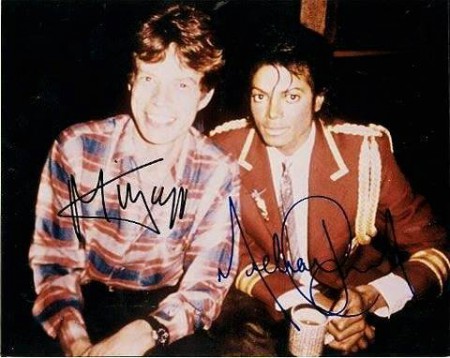
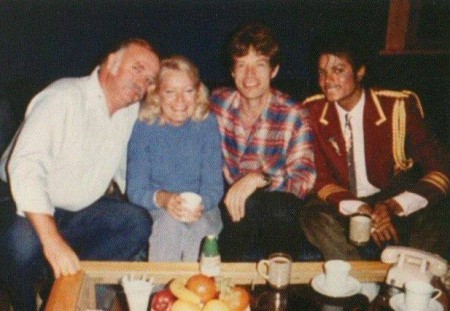
"Whenever he couldn’t sleep, we’d hear him in the studio. The way it was set up we could see the studio windows from the trailer. It’d be three-thirty in the morning, pitch black outside, the whole neighborhood quiet. The light in the studio would come on. You wouldn’t hear anything for a while. There was a TV in there; maybe he was watching videos or something. Then, about fifteen minutes later, you’d hear a bass line. You’d hear him adjusting the volume, the tempo, you’d hear his feet moving on the boards – and then that voice, that voice that sold millions of records. It would just come pouring out of him. Beautiful. Incredible. It gave me goose bumps. How could you not get goose bumps, hearing Michael Jackson perform like that? In the dead of night, just sitting there and listening by yourself, no one else around? We never really got used to it. It was always amazing no matter how many times we heard it”.
Bill Whitfield, Javon Beard (Bodyguards),”Remember The Time: Protecting Michael Jackson in his final days”.
“As a producer, this is the song… ANOTHER PART OF ME. Just admire the instrumentation. It’s so funky and it’s got instruments doing these intricate patterns, and it doesn’t have a chorus-chorus. It’s the setup. That’s the best pre-chorus ever written. And then the pay off is ‘It’s just another part of me.’ The song shows why Michael is the King.”
Bruno Mars
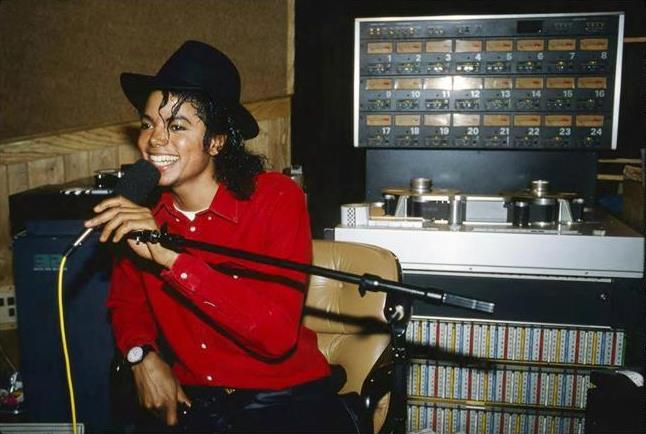
The MJCast: To celebrate The MJCast’s 100th episode, Jamon and Q put the focus back on music and welcome a particularly special guest, Brad Buxer. Buxer was one of Michael Jackson’s key artistic collaborators, who worked with Jackson from the Dangerous album onwards, and who would become one of his closest producers, musicians, and songwriters. Along with Michael Prince, there was no one else who Michael Jackson trusted more to capture his most personal creative visions.
The guys dive into an incredible in-depth discussion with Buxer about his early life and music career, how he came to work with Jackson, creating the Dangerous, HIStory and Invincible albums, acting as Musical Director for both Dangerous and HIStory World Tours, what it was like playing music and writing songs with Jackson, insights into Jackson’s life as a father, details about working together in the final years of Jackson’s life, Buxer’s thoughts on unreleased tracks, and much more:
He’d tell me that my arm wasn’t extended enough in one song, or that my little finger should have been touching my thumb, that kind of thing. It was a very super-detailed movement and style that you had to have in every little thing you did, but that detail and perfectionism was what made him such an incredible performer."
Cris Judd, dancer on HIStory Tour
THAT TIME MICHAEL WAS PICKED UP AND THROWN ACROSS THE ROOM BY ANGELICA HUDSON -- AND GOT SCARED OF HER!
By Terri Hardin
Once the reading was over, Francis asked us to assemble and get ready for our first improvisation session.
He separated the cast into 3 parts. The first consisted of the puppeteers and suit performers. The second part was Michael Jackson and the third was Anjelica Huston.
The scene was to be in a Day Camp. And in this improvisation, we were told what we would play. Group one became the children at the camp, Michael was the camp counselor and Angelica was the owner of the camp.
Then we were each given a secret. Only the particular group knew their secret. Our secret was that under no circumstances were we to mind Michael no matter what he said. Michael’s secret was that he had to get us to mind him or he could be fired. Anjelica’s secret was that she was to come in to fire Michael.
ACTION!
We jumped around, giggling and pulling on Michael as he pleaded with us to stop.
“Please behave, or I could be fired,” he said in his high-pitched voice.
We ignored him and continued to be difficult.
Anjelica entered and the air seemed to be sucked from the room.
“Michael Jackson!”
Michael stood straight up and turned to face her as she slowly crossed toward him.
Anjelica reached out and took Michael by his shirt, and lifting him up off the floor, her face inches from his she spoke.
“You insignificant little worm, you’re Fired!”
Then she pushed him away sending him backward struggling to keep his balance.
Michael slipped backward and slid on the smooth floor of the sound stage, when he finally stopped we could see that he was shaking. Francis yelled “CUT!”.
We stood there in surprise. Michael didn’t move, he was still shaking. He finally got up and from that day forward he was afraid of Anjelica Huston.
Do you see what Francis did? He had placed each of us in similar roles to our performance. We, the Crew, Michael the Captain and Angelica, the Evil Queen. Pretty smart, huh?
Rehearsals continued and Anjelica now sat most of the time on a ladder way up in the air. This was just fine with Michael Jackson.
However the rehearsal could be filled with fun and frolic. For example, Francis asked me to stand in for one of the Whip Warriors as the suit performers played the creatures in rehearsals. I’m very good with a whip. I looked at Michael and cracked the whip by his feet. He jumped and I told him to run and I cracked the whip again. I was smiling when I said this and Michael playfully ran away and I chased him all over the sound stage. Everyone could hear him giggling and jumping as I chased him. Close your eyes and you can hear his high-pitched voice.
“Oooh! Ahhhh!”
“Stop playing around you two!” Francis looked at the both of us with his hands on his hips.
[..]
During shooting, production asked Anjelica to come and try out the flying harness she would be wearing as the Wicked Queen. When she saw it she decided that she would only allow them to fly her up about 5 feet.
“Who will we get to do the high stuff?”
“Get Terri, she seems stu…, I mean, she seems capable of doing this stunt.”
Production then offered me the chance to stunt double for Anjelica. I accepted — I mean, duh! In all the shots where you see the full shots of the Wicked Queen in the air above the dancers, it’s me.
It was amazing hovering high in the air while Michael Jackson stares right into your eyes. Wow! Since I was the stunt-double for Anjelica Huston, the makeup artist Tom Burman had to make me look exactly like Anjelica’s Wicked Queen.
As Francis set the cameras up to shoot the Wicked Queen’s point of view, wranglers got me into position and hoisted me up as the queen. Anjelica had finished her close-ups and had gone back to her trailer to rest.
We were all ready to begin. I recited the lines and Michael looked up. His line was
“Not only see this gift, you highness, but hear.”
Do you remember it? Picture it in your mind now. See Michael’s face as he spoke this line in the film. Do you have it? He was good, right?
Now imagine Michael looking up and upon seeing the Queen, all the blood draining out of his face. His voice shrank to a whisper and he’d turn away as if almost crying.
“Cut!” Francis wasn’t happy. There had been too many takes to get the shot. He went to Michael and with gentle pressure asked Michael what was wrong. When Michael didn’t seem to have an answer, Francis reminded him that he was the fearless Captain EO.
Michael tried again. However try as he could, every time he looked up at the Wicked Queen (me). He cowered. Francis suggested that Michael take five to collect himself.
Watching this, I realized that Michael thought I was Anjelica. Remember the Improv?
I begged the wrangler to let me down. I finally told him I had to go to the bathroom and if he didn’t want a golden shower, he best let me down.
The technician just let go of the rope that held me. When my brain finally registered how fast I was falling to earth with my feet bound behind me I thought my face would hit the cement. Thank goodness the tech grabbed the rope back.
I didn’t wait to justify my positioning but ran right over to where Michael was relaxing.
“Michael Jackson!”
I was using my very best Anjelica voice at first, then I softened my voice and looked up at Michael.
“Michael, it’s me?”
“Terri?”
“Oh yea! It’s me baby. And if you don’t get this scene right, I’m coming for you Michael.”
After that, what you see is the direct result of Michael Jackson being able to do what he was supposed to because he realized it was NOT Anjelica Huston.
Source: micechat.com

Interview with the Dance Cast of CAPTAIN EO, Starring Michael Jackson
The amazing thing, I was only meant to be on the film, the project for three days and it turned out to be like three and a half weeks, almost a month of filming and the thing I took from it the most was watching Michael Jackson perform at performance level in his rehearsals. I said ‘wow that’s the consummate artist right there, that’s the pinnacle of where I would like to go and the kind of skills I would like to have as an artist that I can come and my rehearsals are performances, you know. So, I took that from him and that’s what I’ve been trying, to be consistent with in my work as well.”
All In Your Name [Official Music Video] - Michael Jackson Feat. Barry Gibb [2002]
Having worked with some of the biggest names in pop and R&B, Jerkins thinks back to his experience with Michael Jackson on the “Invincible” album in 2000 and 2001 as a key moment in his own career in music. “He challenged me to dig deeper,” Jerkins reflects. “Michael [would say], ‘Go to the junkyard and hit on things and make sounds.’ There were a lot of 3 and 4 a.m. phone calls. ‘I need you to go to the studio for me.’ I’d be super tired. I would play songs over the phone and he’d say, ‘I need you to pan the hi-hats differently.’ Genius. How did he hear that over the phone?”
Jackson had a way of testing those who worked with him. Jerkins explains: “We were finishing the album and Michael wanted a song that could come out at Halloween. He had ‘Thriller,’ he had ‘Ghost’ — he always wanted spooky songs. He loved the track for the song ‘Threatened,’ only he said, ‘It’s missing Rod Sterling. I need Rod Sterling to rap on this.’ At first I’m thinking, ‘Is there some new rapper called Rod Sterling that I don’t know about?’ I said, ‘Elaborate, Michael.’ He said, ‘You know Rod Sterling from “The Twilight Zone.”‘ Five days later he says ‘Did you get Rod Sterling to rap on it yet?’ I said, ‘Michael, Rod Sterling is dead.’ He said, ‘Yeah but I still need him to rap on it.'”
Jerkins obtained VHS copies of every ‘Twilight Zone’ episode, deconstructed Rod Sterling’s voiceovers and built, with the help of a rapper, an eight-bar rap using the vocal snippets.
Jerkins continues: “Michael comes back in the studio and again, he says, ‘Did you ever get Rod Sterling to rap?’ I said ‘As a matter of fact I did.’ He looked at me as if to say, ‘You’re lying. There’s no way. I was just playing around with you!’ I pressed play and the joy that came on his face. It looked like he wanted to cry. He was so amazed that we got that done and that I took on that challenge and he loved it. It was sad it never came out [as a single] as he had big plans for that song.”
Rodney Jerkins, producer (for Variety: variety.com/2020/music/news/high-note-movie-soundtrack-rodney-jerkins-interview-tracee-ellis-ross-michael-jackson-1234615892/?fbclid=IwAR0vLyA1fns0UizzJAoK4OssV1F-J6jFpOyj4AzN8ngV6XdzO--RRIli0tM)
„Michael was very calm, he liked to chat and hang out, and he was totally at home in the studio because we engineers were his playmates. No one wanted anything from him in the studio, and you could see how relaxed was there. He would come in with wrinkled, dirty clothes because he didn't have to dress up, he could come straight from his house or hotel to the studio and didn't have to worry what he looked like. I always tried to make him feel safe and at home and I never asked him for anything, like photos or signatures.“
"He would drive in his big red truck and come in with his son Prince. Some sessions it was just me, Michael and Seth Riggs, his vocal coach. Prince would be running around the studio somewhere, and there were three sessions when I actually ended up holding Prince while Michael was recording his vocals. I would be at the console, working with one arm and Prince in the other. During breaks, when Michael wasn't recording vocals, he liked to sit and watch cartoons with his son. He would sit there and watch them, laughing, stirring a cup of hot water or tea with a spoon. Then when I needed to record him he would be ready, and when we were done, he would go back to watch the cartoons.“
C.J. DeVillar (on Invincible sessions)

“Michael is so professional, so wonderful to work with and doing vocals with Michael is an absolute joy. He’s got ears for…the pitch and everything. Michael is polite and kind. You know, he’ll say: “Can I hear a little more piano in the earphones please?”. And he’ll say thank you. This is an industry where you don’t hear those words a whole lot…I’ve never ran into anybody that works with Michael and doesn’t regard it as a pleasant experience, it’s just great…And another thing I’ve learned with recording Michael is I’ll set up the vocal mike and I’ll have Michael perform singing on my drum platform which is an eight foot square plywood platform about eight inches off the floor…one reason is that he dances when he sings and I love to have that as part of the sound because, first of all his time and his rhythm is impeccable, even when I do backgrounds Michael does little vocal sounds and snaps his fingers and taps his foot.”
Bruce Swedien (photo below)
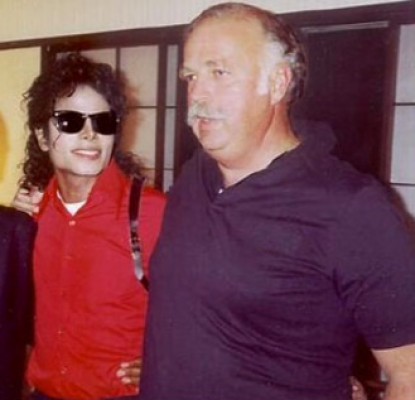
"Michael Jackson sang [ Prince's] line to me. I sang it back and that's how I got the part," recalled Huey.
“I stood right next to him on the solo lines [of "We Are The World," because I had the line right after he did. We had to share a position there for a couple hours. And we chatted. He said lots of nice things about my songs, and he knew our stuff, and he was just sweet, sweet, sweet.
You know, Quincy Jones was producing, and they wanted to make one full sweep on the lead vocals, and they kept getting about halfway and somebody would forget the words and they’d stop again. And so we never got a chance to rehearse our lines down at the end, as it were. So I sort of stood up for that. I said, ‘Hey, can you go all the way through, at least, so I can rehearse? Stevie Wonder over there has sung his part four times!’ And Michael thought that was really funny, so he said, ‘Yeah.’ And the very next pass, we did the whole thing, we made it all the way. Clearly it was the good version. And I saw Quincy telling the engineer, ‘Okay, let’s do another,’ and Michael had his headphones off, and Quincy says, ‘All right, let’s do another one!’ And Michael, very concerned, grabs my hand and says, ‘They’re gonna save that last one, aren’t they?!?’ ‘Cause he knew that was the one. Obviously, what can be said about the guy? Super talented, and super fabulous, and super sweet at the same time. He was very comfortable. He was just really nice, man. Michael was just a really sweet guy.”
Huey Lewis about We Are The World
“He told the director, he told everybody, how he wanted that stage, what type of lighting he wanted. He told them where to put the spotlight. ‘When I put my finger like this …’ He directed them.”
Suzee Ikeda on Michael’s direction that lead to his Moonwalk debut on Motown 25
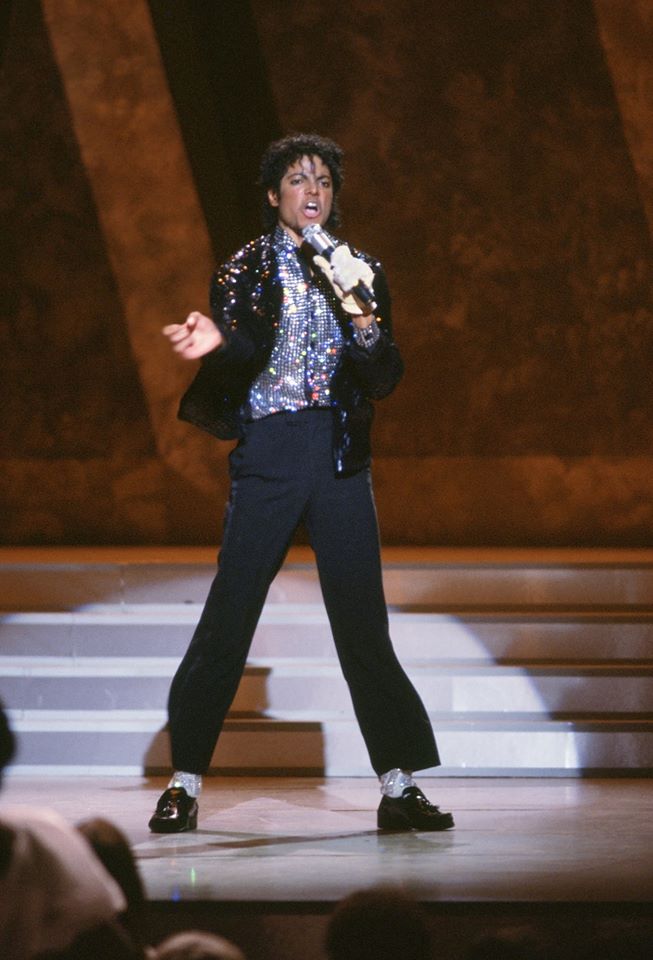
The measures of Michael Jackson
"He was a master at recruiting the right person for what he had to do, perhaps because he had an incredible ability to feel the greatest potential in others and get the best out of them."
"Michael Jackson loved military and royal styles, as you can tell, for many of the clothes he wore. Besides, he was always intrigued by what others were wearing.
He once sent Dennis and me to Europe for weeks, just to keep an eye on people's fashion and keep him informed. He also read magazines furiously, not the stories about him, but to see the latest trends so that he could make these images and transfer them into his clothing ideas.
We bought all the magazines at the booth and then he told us to sit down and take out all the pages of the things we found interesting. So we showed him all this and from there he took some and then we could talk about these images and turn them into clothes.
We used the seven basic measurements for all of her clothes: casual pants (Billie Jean, with pleats, 40s style). The military jacket, cut short to the waist. Suit. Beat It, Billie Jean and Thriller jackets. Shirt for Dirty Diana and Come together. And a casual red velvet shirt.
In fact, in 1985, Dennis took the steps toward Michael, and we lowered the standards that became the basis of our daily lives. We never came back to prove it, mainly because he hated the evidence and it saved us all the time. If we didn't have Michael's mannequin with his measurements, we could never make his clothes as fast as we did.
We usually had less than four weeks. Michael almost always starts with the words, "Time is not our friend, Bush, but I need ..."
When we ran out of time, Michael was behind him and whispered, "I know what you can do for me."
He was the most prolific and successful artist in the world, and he believed I could do something. Michael had this way of connecting with the people who worked for him and getting them to do their job, especially those who seemed impossible. He was a master at recruiting the right person for what he had to do, perhaps because he had an incredible ability to feel the greatest potential in others and get the best out of them.
Dennis and I often went too far because we knew we could fulfill Michael, and our confidence in that ability was based on Michael's faith in us. If someone said "No" to Michael, he just walked away from that person, but "no" isn't even in my dictionary or Dennis's when it comes to dressing Michael Jackson. ‘’
Waist: 28 inches - 71.1 cm
Sleeve - 34.5 inches - 87.63 cm
Chest: 36 inches - 91.4 cm
Crotch: 32 inches - 81.2 cm
Michael Bush, stylist for Michael Jackson in a selected excerpt from the memoir "King of Style: Michael Jackson Dress Up"

"My very first tour with the Jacksons on their "Destiny Tour" in 1979!!! Here...in heart, spirit mind and soul, touching the lives and the souls of the fans, with our special love of song, rhythm and rhyme...and smiles painted on our faces and theirs..."
Jonathan "Sugerfoot" Moffett
...He was a very, very funny man. A real prankster who even laughed at himself. I remember I was at the Hilton Hotel in California doing some work for him.
I don't remember now what the project was. Michael was on Sunset Boulevard in a recording studio. He called me and it was around 11 pm, and he said..."Did you manage to finish our project?"
And I said, "yes, I'm done."
“Come here to the studio!.”
So I went there and when I walked in the front door, he picked me up and we went to a little warehouse, and he said...“David…someone is mad at me”.
And I asked, “What happened? ”
There was Slash and Jimmy Jam and all those great musicians. And Michael made them all play a hundred times! These guys weren't used to recording the same song more than once and Michael kept them in the studio until 5am!
I had a big portfolio, a kind of folder with all my drawings. And after we had seen and had pizza, I went back to the hotel. Returning to the hotel, I noticed that my briefcase was too heavy, I opened the briefcase, and it was like 10 kilos of gum cascading down. First of all, I didn't see him putting it there and secondly, who had hundreds or thousands of pieces of gum?
I wonder where he got them…''
David Nordahl, Michael Jackson's personal portrait artist
“I was in California the first time I heard Michael Jackson wanted to record with me. I was like, Nah, no way, he's too big, it can't be true. Then I got a call from Michael's people at my hotel telling me he was interested. But I still wasn't believing it-- I thought they were setting me up for a TV practical jokes show. So my partner and me go to the place, and while we were waiting we were talking and cursing up a storm-- I was thinking that if it were a blooper show, they wouldn't be able to use it. Then Michael called and said he was on his way. When he got there he was just like 'Hey, how ya doin?’ Michael is just as regular as everyone else is. We talked about all the normal stuff guys talk about. He's real smart. People forget that he's the most incredible entertainer we've seen in our lifetime. His name is Michael Jackson, not Super Michael Jackson. He makes mistakes just like all of us. My favorite Michael Jackson song is "Music and Me". It's an old one, about him and his music, his love for music, and the time they've had together. It's like a song that would be sung to a girl, but it's all about music.”
Heavy D -- MC/label executive (rapped on Jam, 1991)
This is how the song Give In To Me is born:
“Michael wanted to revolutionize the way tours were being done. He was always thinking like a great producer, too. He was telling us we needed to design a way to maximize the audience that could see him with less travel time for him and the company. So, he proposed setting up the show for 2 or 3 months in a single location, make that portal, as opposed to being on a plane, jumping from city to city twice a week. Just as he did on the History Tour, when we went to Northern Africa. The idea was to get up in a region that was struggling and could really benefit economically from having us there. Everything Michael did came from a place of love and commitment to do good. That’s the way he was with us working on the show. You felt like you were being nurtured, constantly stimulated and encouraged to come up with the best ideas in a collective situation. And that’s where his art was coming from. His concept was not just to make a great song you could dance to. His way was to reel you in and get your attention so then you’d get the deep message. That was the science to it. That’s why his music transcended generations, appealed to children and older people…everyone.”
Travis Payne about Michael Jackson’s This Is It Tour Plans
Keith Harris - Michael Jackson Flew Us Out To A Castle In Ireland:
“I do know that in his life he would struggle with being so well known, that was sort of a constant struggle throughout his life. But I do have to say, I spent a lot of time with Michael alone on set, he and I had a lot of scenes together and he taught me so much. He was so dedicated. We would go through – before we even shot he and I would spend sometimes like half an hour together just improving, ’cause he was so committed to it.”
[…]
“Michael was magic, pure and simple. He was a man who believed in the goodness of mankind and embodied pure unconditional love for the world. I am so sad on so many levels. For the loss of an innovative genius and who was music and dance personified, for the loss of a man who loved the whole world and touched so many lives, but mostly, for me personally, the loss of a friend that I loved so dearly. Most people don’t know about how close I was to Michael for many years following ‘Moonwalker/Smooth Criminal’ because I was never one to exploit that, even to this day I rarely talk about it, for that was a friendship that I honored and respected as private. I feel compelled at this time though, to speak of my amazing friend, as a witness to his life, and the gentleness of his soul. He taught me so much, both as an actor and as a person, he continually inspired me to reach beyond my boundaries. He and I spent a great deal of time, one on one, while filming ‘Moonwalker.’ I remember that he told me once to never rush an emotion, that everything in life has a rhythm, and that it is the pauses and silences that speak the truth. He understood this better than anyone, he had a way of quietly inspiring everyone around him to be better than ever thought they could be. He helped so many, and inspired us all. Michael believed in Magic, he believed that we could change the world, and he had such unconditional love that when you were around him, you couldn’t help but believe it too. He is intertwined in all of who I am, I became a dancer because of him, I became an artist because he inspired me to dream, and a writer because he taught me the power of moving people through words and actions. I love you my friend, and I know you are in a better place, we were blessed to have you for as long as we did.
Kelley Parker who was the young girl in Michael Jackson’s 1988 movie Moonwalker. From 2009 interview.
"He would drive in his big red truck and come in with his son Prince.
Some sessions it was just me, Michael and Seth Riggs, his vocal coach.
Prince would be running around the studio somewhere, and there were three sessions when I actually ended up holding Prince while Michael was recording his vocals. I would be at the console, working with one arm and Prince in the other. During breaks, when Michael wasn't recording vocals, he liked to sit and watch cartoons with his son. He would sit there and watch them, laughing, stirring a cup of hot water or tea with a spoon. Then when I needed to record him he would be ready, and when we were done, he would go back to watch the cartoons.“
C.J. DeVillar on Invincible sessions
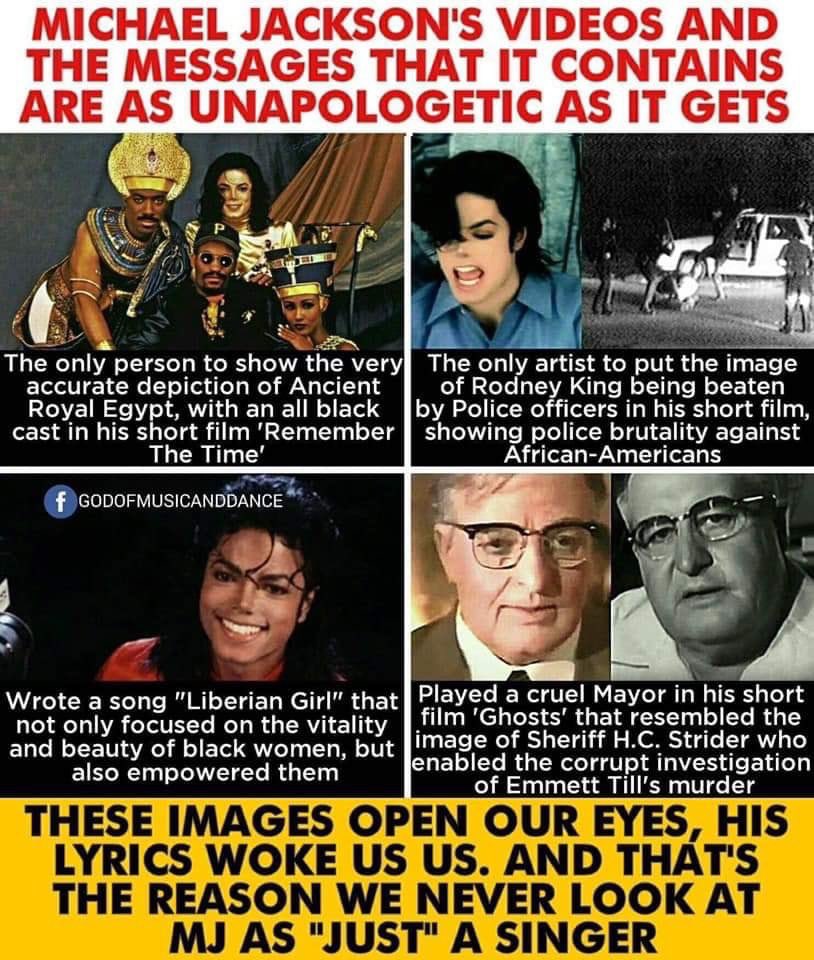
One of Michael Jackson’s most trusted choreographers, Travis Payne's achievements includes Michael’s Emmy-nominated 1995 MTV performance, Michael's DANGEROUS tour Michael Jackson’s “Ghost” and Michael + Janet’s “Scream” video.
In this exclusive interview with Sonia Lowe, Payne discussing working closely with Michael to prepare for his comeback tour, This Is It.
Working together since The Dangerous World Tour, Payne reveals Michael's creative process, in the studio and what it was like to tour the globe and share a stage with The King Of Pop.





